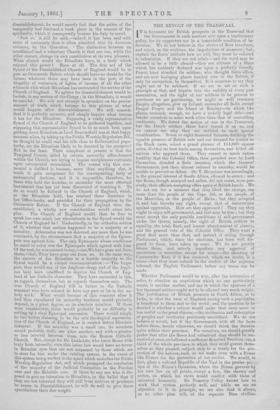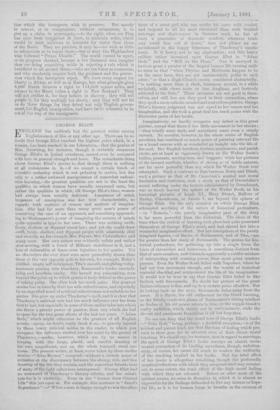THE REVOLT OF THE TRANSVAAL.
I T is fortunate for British prospects in the Transvaal that
the Government in such matters acts upon a traditionary policy, for its supporters are in a lamentable condition of in- decision. We do not believe in the titories of Boer treachery, and reject, on the ,evidence, the imputations of massacre ; but, explain the Boers' attitude how we will, they must be reduced to submission. If they are not rebels—and the word may be allowed to be a little absurd—they are citizens of a State which has suddenly declayed war upon a perfectly friendly Power, have attacked its soldiers, who thought them allies, and are now besieging places handed over to the British, if only for occupation, by themselves. It is nonsense to say they ought not to be subdued. If we are to act on such a principle as that, and inquire into the validity of every past annexation, and the right of our soldiers to be present in provinces we are garrisoning, we might as well renounce Empire altogether, give up Ireland, surrender all India except Bengal Proper and the Island of Bombay—in which two places, curiously enough, we have a strictly legal title—and betake ourselves to some work other than that of controlling continents. We detest the notion of war in the Transvaal, but the Dutch settlers ,there have forced it on us, and we cannot see why they are entitled to such special consideration. Seven or eight thousand farmers,-disliking the equable pressure of British rule and our demand for justice to the Black races, seized a grand plateau of 114,000 square. miles, divided its best lands among themselves, and killed all natives who opposed them. They roused so much native hostility that the Colonial Office, then presided over by Lord Carnarvon, dreaded a Zulu invasion, which the farmers' Government, just then almost reduced to anarchy, would be unable to prevent or defeat. Sir T. Shepstone was accordingly, in the general interest of South Africa, allowed to annex ; and the Boers, though annoyed and sullen, did not resist, even pas- . sively, their officials accepting office again at British hands. We do not say for a moment that they liked the change, any more than the people of the Cape did, or the people of the Mauritius, or the people of Malta ; but they accepted it, and lost thereby any right, except that of insurrection against oppression. How are they oppressed ? They say they ought to enjoy self-government, and that may be true ; but they must accept the only possible conditions of self-government . under the Queen, namely, the right of British settlers to equality, the total, final, and honest abandonment. of slavery, and the 'general veto of the Colonial Office. They want a great deal more than that, and instead of acting through Parliament, which, since the elections, has been well di- posed to them, have taken up arms. We do not greatly blame them, and utterly repudiate any approval of executions or severities, except for crime—the shooting of Commander Raaf, if it has occurred, which we doubt, is a crime—but they Must, submit to the verdict of the supreme tribunal, the English Parliament, before any terms can be made.
Whether Parliament would be wise, after the restoration of order, to abandon an acquisition which no one particularly wants, is another matter, and one in which the opinions of a few thousand settlers ought not to be allowed very much weight. The justification of British presence in South Africa, as in India, is that the sway of England among such a population is beneficial to them and to the world ; and the question to be decided is whether a retreat would niche that sway more or less useful to the great objects,—the civilisation and redemption of peoples and territories previously uncivilised. We do not believe it would, but if the Government, with all the facts before them, decide otherwise, we should think the decision quite within their province. For ourselves, we should greatly prefer that after the Boers had submitted they should be am- nestied at once, and allowed a sufficient Reserved Territory, say, a third of the whole province, in which they could govern them- selves as they pleased, subject only to a treaty for the pro- tection of the natives, such as we make even with a Power like France for the protection of our coolies. We would, in fact, place a reduced Republic of the Vaal in the precise p0.. tion of the Nizam's Dominion, where the Nizam governs by his own law on all points, except a few, like slavery and suttee, on which his views would conflict with those of universal humanity. Sir Pomeroy Colley knows how to work that system perfectly well, and while we see no objection to it in principle, we see also that it allows, as no other plan will, of the separate Boer eivilisa- tion which the insurgents wish to preserve. But merely to retreat, or to compromise, without submission, is to give Up a claim to sovereignty,—to the right, when our Flag has once been recognised de ,facto, to maintain order, which would, be most injurious to interests far vaster than those of the Boers. They are patriots, it may be--we wish as little to calumniate as to injure them—but so were the Highlanders who followed "Prince Charlie." The world cannot be upset, or its progress checked, because a few thousand men imagine they are doing something noble in rejecting a rule which is beneficial to all around them,—who are ten times as numerous, and who absolutely require both the guidance and the protec- tion which the insurgents reject. We have every respect for liberty in Africa, as well as in Europe, but what principle gives 8,000 Dutch farmers a right to 114,000 square miles, and refuses to the Maori tribes a right to New Zealand ? They will not civilise it, for they believe in slavery ; they will not people it, for they multiply too slowly ; and they will not let us do those things, for they detest not only English govern- ment, but English immigration, and have twice retreated to be out of the way of the immigrants.















































 Previous page
Previous page